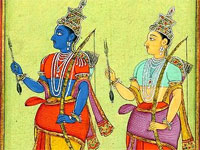Just In
- 2 hrs ago

- 5 hrs ago

- 7 hrs ago

- 9 hrs ago

Don't Miss
- Sports
 ISL Transfer News: Jeremy Manzorro unlikely to return at Jamshedpur FC after Contract Expiration
ISL Transfer News: Jeremy Manzorro unlikely to return at Jamshedpur FC after Contract Expiration - Finance
 Relief For Students As School Summer Holidays Begin Across States
Relief For Students As School Summer Holidays Begin Across States - Movies
 Salman Khan House Firing: Shooters Were Paid A SHOCKINGLY HUGE Amount To Scare The Superstar; Check DEETS
Salman Khan House Firing: Shooters Were Paid A SHOCKINGLY HUGE Amount To Scare The Superstar; Check DEETS - Education
 PSEB Class 10 Result 2024 Declared
PSEB Class 10 Result 2024 Declared - Automobiles
 The Rezvani Retro RR1 Is A Modified Porsche 911 Done Right
The Rezvani Retro RR1 Is A Modified Porsche 911 Done Right - Travel
Unveiling The Spiritual Heart Of India Through Its Historic Cities
- News
 NCP SP Leader Supriya Sule Files Nomination From Baramati LS Seat
NCP SP Leader Supriya Sule Files Nomination From Baramati LS Seat - Technology
 Paytm Begins Migrating Customers to New UPI IDs: What Does it Mean for You?
Paytm Begins Migrating Customers to New UPI IDs: What Does it Mean for You?
Kabir-Part IV

As Kabir intensified his spiritual practices he felt more and more the need to have a formal Guru. He had a great fascination to have Swami Ramananda of Kashi as his Guru. His Muslim background, he thought, might dissuade Ramananda from initiating him. So one early morning before sunrise he laid himself on the steps of a ghat on the Ganga where Swami Ramananda came for his daily bath. Unconsciously stepping upon the head of Kabir in the darkness, Ramananda uttered aloud the name of God as 'Rama'. Up rose Kabir, repeating the same Name as his mantra. Ramananda was overwhelmed when he saw ' the great yearning and devotion of this disciple. Kabir later said about this historic incident: 'When I got Ramananda as my Guru, my sorrows were destroyed, and my doubts disappeared. Such is the power and grace of the Guru!
As a principal disciple of Ramananda, Kabir accompanied him on pilgrimages throughout India. They visited several places like Puri, Rameswaram, Kanchi, Vijayanagar, Mathura, Vrindaban, Hardwar, Broach, Dwaraka, Chitrakoot and Prayag.
Kabir taught Nirguna Bhakti which included the concept of Sankara's Advaita — the oneness of Jiva with the Supreme Self — the Yoga practices of the Natha Yogis, the religion of love of the Sufis, and Islam's brotherhood of man and the concept of formless God. He stressed on God's grace as most essential for spiritual illumination. He emphasized the importance of cleaning the mind of its desires and living a life of truthfulness, simplicity, and self-control. Kabir called his God 'Nirguna', in the sense that He was free from the three Gunas and their derivatives: ego, mind, senses, etc. Though a Jnani by temperament, Kabir preached to the common man the love of God as the means for highest spiritual enlightenment.
Kabir did not accept either the Avataras of Hinduism or the 'last and best messiah-hood of Mohammed.' He preached against all exclusiveness, privileges and priestcraft in Hinduism as well as in Islam. He preached against the habits of meat-eating and consuming intoxicants, and spoke strongly against the evils of adultery. He laid greatest stress on faith in the Guru and serving him in every way. Listening to and serving holy men, he said, was a powerful force for spiritual upliftment.
The simple religion he taught on the authority of his direct realization of God, cut at the roots of all priestcraft of both Islam and Hinduism. Naturally priests complained against him to the Emperor in Delhi that Kabir was preaching contrary to the accepted religions of the day. When Kabir was summoned to the court of Sikandar Lodi he refused to salute the Emperor. There was no Emperor except Rama, felt Kabir. This and the priests' charges gave a long handle to the Emperor to punish him. On different occasions, he got Kabir tied to a stone, thrown into water, also into burning flames, and pushed under the feet of a doped elephant. From each trial Kabir came out unhurt! The Emperor had to submit and acknowledge at last the sainthood of Kabir.
To be continued
About the author
Swami Gautamananda Maharaj is the President of Ramakrishna Math Chennai, Tamil Nadu, India
-
 sri ramakrishnaKabir-PartVII
sri ramakrishnaKabir-PartVII -
 sri ramakrishnaKabir-Part V
sri ramakrishnaKabir-Part V -
 sri ramakrishnaKabir - Part III
sri ramakrishnaKabir - Part III -
 sri ramakrishnaKabir - Part II
sri ramakrishnaKabir - Part II -
 sri ramakrishnaKabir - Part I
sri ramakrishnaKabir - Part I -
 hair careOn John Abraham’s Birthday, His Iconic Hairstyle From Action-Thriller Film Dhoom That Became New Cool Trend
hair careOn John Abraham’s Birthday, His Iconic Hairstyle From Action-Thriller Film Dhoom That Became New Cool Trend -
 anecdotesFind God In.......
anecdotesFind God In....... -
 sri ramakrishnaKabir-Part VI
sri ramakrishnaKabir-Part VI -
 anecdotesThe Ball Of Thread
anecdotesThe Ball Of Thread -
 anecdotesA Brick For His God
anecdotesA Brick For His God -
 sri ramakrishnaMeditation On The Story Of Kuchela (Poverty
sri ramakrishnaMeditation On The Story Of Kuchela (Poverty -
 sri ramakrishnaThe Mystery Of The Moment-(The Plan Of Nature)
sri ramakrishnaThe Mystery Of The Moment-(The Plan Of Nature)


 Click it and Unblock the Notifications
Click it and Unblock the Notifications



